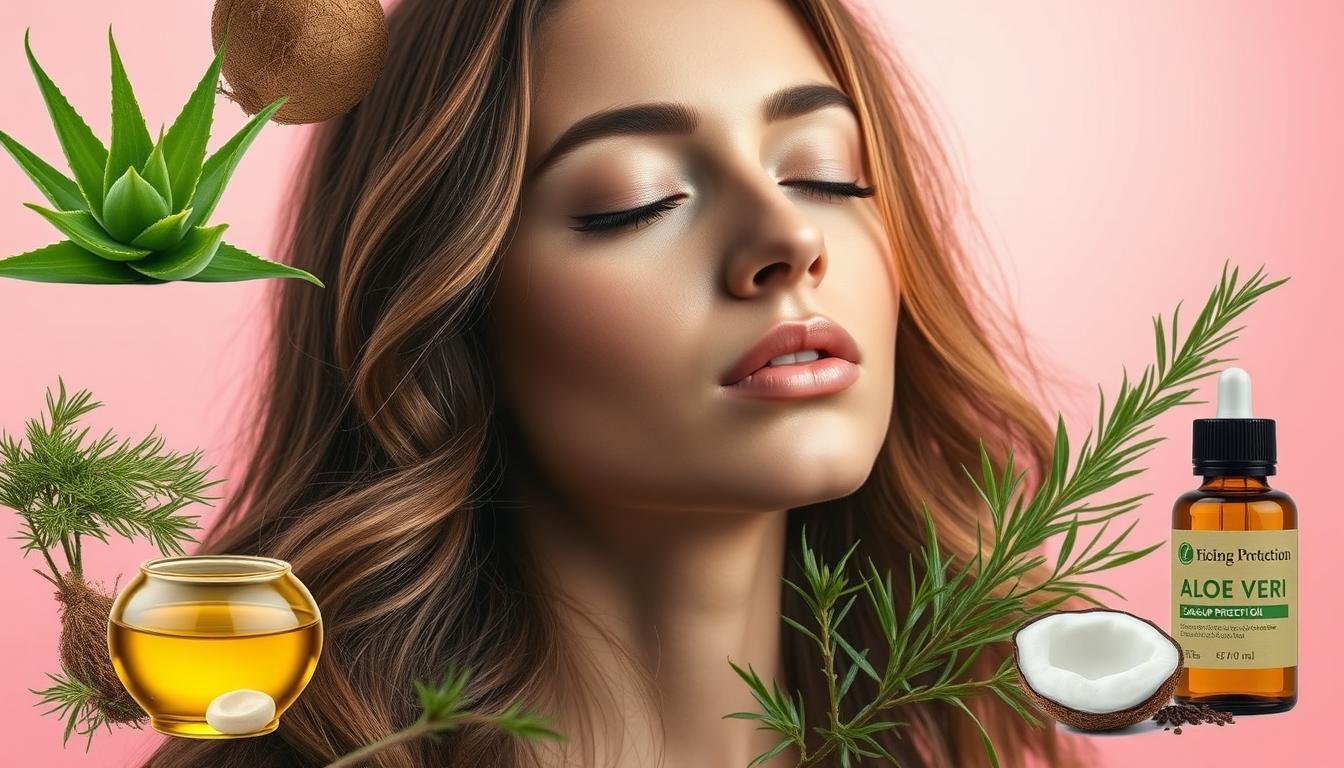A Natural Recipe to Strengthen and Protect the Scalp from Infections
Unlock a natural scalp protection recipe to fortify your hair and shield against infections. Discover holistic care for a healthier scalp.

Keeping your scalp healthy is key for great hair and feeling good. Did you know almost half of the world gets dandruff at least once? Scalp infections like tinea capitis and seborrheic dermatitis cause itching, flaking, and hair loss. Stress, bad hygiene, and harsh chemicals can make these problems worse.
While there are many products out there, natural recipes are kinder and safer. Tea tree oil and coconut oil are great for fighting fungal infections. Using these natural methods can make your scalp stronger and healthier. Each recipe here will help you fight scalp infections better, keeping your scalp in balance.
Tea Tree Oil and Coconut Oil Scalp Treatment

Using tea tree oil and coconut oil on your scalp is great. It fights fungus and bacteria. This mix keeps your scalp healthy and stops irritation.
Ingredients
- 2 tablespoons of coconut oil
- 5-10 drops of tea tree oil
How It Works?
Tea tree oil fights scalp infections and dandruff. Coconut oil makes your scalp moist and fights bacteria. Using it often makes your scalp healthier. It helps prevent flaky skin and irritation.
Application Tips?
To use the treatment, follow these steps:
- Mix coconut oil and tea tree oil in a bowl until they blend well.
- Massage the mix into your scalp with your fingers.
- Let it sit for 30 minutes so the oils can work.
- Then, wash it off with mild shampoo and warm water.
Pros and Cons
| Pros | Cons |
|---|---|
| Natural and effective antifungal properties | May cause irritation for those with sensitive skin |
| Moisturizes and nourishes the scalp | Strong scent may not be preferred by everyone |
| Cost-effective solution compared to store-bought treatments | Results may vary from person to person |
Neem Oil and Aloe Vera Soothing Mask

This soothing mask uses neem oil and aloe vera. It’s great for scalp issues like irritation and fungus. It helps your hair stay healthy and calms inflammation.
Ingredients
- 1 tablespoon of neem oil
- 2 tablespoons of aloe vera gel
How It Works?
Neem oil fights scalp yeast infections. Aloe vera adds moisture and calm. Together, they make a mask that soothes and keeps your scalp healthy.
Application Tips?
To make this scalp mask, follow these steps:
- Mix neem oil and aloe vera gel in a bowl.
- Put the mix on your scalp, covering all areas.
- Leave it on for 30-45 minutes.
- Rinse with mild shampoo to remove the mask.
Pros and Cons
| Pros | Cons |
|---|---|
| Helps treat and prevent fungal scalp infections | Might cause sensitivity in some individuals if used excessively |
| Soothes and hydrates the scalp | Strong smell may not be appealing to everyone |
| Easy to prepare with simple ingredients | May require regular use for best results |
Apple Cider Vinegar and Rosemary Rinse

Looking for healthy, vibrant hair? A good rinse can help a lot. Apple cider vinegar and rosemary make a great scalp rinse. They balance pH levels and clean naturally.
Ingredients
- 1 cup of apple cider vinegar
- 1-2 tablespoons of rosemary leaves (fresh or dried)
How It Works?
Apple cider vinegar is acidic, but it’s good when diluted. It matches the scalp’s pH, fighting off bad microbes. Rosemary adds more antimicrobial power.
Together, they clean the scalp well. They might even help heal scalp problems faster.
Application Tips?
Making this rinse is easy. Boil water, then steep rosemary leaves for 15 minutes. Mix the cooled rosemary with apple cider vinegar, diluted with water.
Use it as a final rinse after shampooing. Dilute the vinegar to avoid scalp irritation.
Pros and Cons
| Pros | Cons |
|---|---|
| Balances scalp pH | Might irritate the scalp if not diluted |
| Acts as a natural cleanser | Possible dryness with frequent use |
| Supports healing of scalp irritations | Risk of hair breakage if used excessively |
| Enhances hair health with rosemary | Consult a dermatologist if experiencing issues |
Witch Hazel and Peppermint Cooling Spray

This cooling spray mixes witch hazel and peppermint for better scalp health. It has soothing agents for relief from irritation. It’s great for refreshing your scalp after being in the sun or after working out.
Ingredients
- 1/2 cup of witch hazel
- 5-10 drops of peppermint essential oil
How It Works?
Witch hazel is a natural astringent that helps reduce inflammation. It makes your scalp healthy. Peppermint makes your scalp cool and keeps it healthy with its antifungal benefits.
Application Tips?
To make your cooling spray, mix witch hazel and peppermint essential oil in a spray bottle. Shake it well before you use it. Spray it on your scalp when you need to, like after being in the sun or after working out. But, peppermint’s smell can be strong and might bother sensitive skin.
Pros and Cons
| Pros | Cons |
|---|---|
| Enhances scalp health | Strong peppermint scent may cause irritation |
| Natural soothing agents | Requires proper mixing and storage |
| Refreshing after sun exposure | May not suit all hair types |
Probiotic and Salicylic Acid Scalp Exfoliant

This natural solution helps your scalp stay healthy. It fights dandruff and keeps your scalp safe. You’ll see big health benefits and a balanced scalp.
Ingredients
- 1/4 cup of probiotic yogurt
- Crushed salicylic acid (medicated aspirin)
How It Works?
Probiotics in yogurt balance your scalp’s bacteria. This stops bad fungi and fights dandruff. Salicylic acid removes dead skin and flakes, making your scalp clean.
Together, they make a strong exfoliant. It cleanses and cares for your hair roots.
Application Tips?
To use the scalp exfoliant:
- Mix the probiotic yogurt with crushed salicylic acid until smooth.
- Put the mix on your scalp.
- Massage your scalp for 5-10 minutes to let it work.
- Rinse with warm water.
Pros and Cons
| Pros | Cons |
|---|---|
| Boosts scalp health with probiotics | May cause irritation in sensitive skin |
| Aids in reducing dandruff and flakes | Not suitable for those allergic to aspirin |
| Natural ingredients free from harsh chemicals | Requires regular application for best results |
Aloe Vera and Neem Anti-Fungal Mask

This mask is great for fighting scalp infections. Aloe vera and neem work together to solve scalp problems. They help with dandruff and fungal growth.
Aloe vera cools and soothes the scalp. Neem fights fungus, like the one that causes dandruff. This mask helps with flaking and itching.
Ingredients
- 2 tablespoons of aloe vera gel
- 1 tablespoon of neem leaf powder
How It Works?
Aloe vera calms an itchy scalp. Neem fights fungus that causes dandruff. This mask helps with scalp problems.
Application Tips?
Mix aloe vera gel and neem powder into a paste. Put it on your scalp well. Let it sit for 30-40 minutes before rinsing.
Watch for any skin irritation while using it.
Pros and Cons
| Pros | Cons |
|---|---|
| Natural ingredients with minimal side effects | May not work for everyone |
| Soothes scalp irritation effectively | Requires consistent application for best results |
| Reduces flaking and itching associated with dandruff | Preparation time may be a deterrent for some |
Tea Tree and Lavender Antimicrobial Serum

This serum mixes tea tree and lavender. They help your scalp a lot. Lavender makes it calm, and tea tree fights fungus.
Ingredients
- 2 tablespoons of jojoba oil (carrier oil)
- 5-10 drops of tea tree oil
- 5-10 drops of lavender oil
How It Works?
Tea tree oil fights dandruff and scalp irritation. Lavender oil helps by stopping infections and soothing skin. Together, they make your scalp healthy.
Application Tips?
Mix tea tree and lavender with jojoba oil. Put it in a dark glass bottle to keep it fresh. Massage a few drops on your scalp at night. Rinse in the morning for a healthy scalp.
Pros and Cons
| Pros | Cons |
|---|---|
| Natural ingredients with antimicrobial properties | May cause irritation in sensitive individuals |
| Calming effects on the scalp | Requires consistent application for best results |
| Supports healthy hair growth | May not work for severe scalp conditions |
Castor Oil and Basil Circulation Booster

Looking for a natural way to boost circulation? Try mixing castor oil and basil. It helps hair grow and keeps the scalp healthy.
Ingredients
- 2 tablespoons of castor oil
- 1 tablespoon of dried basil leaves
How It Works?
Castor oil boosts scalp circulation, helping hair grow. Basil adds extra benefits with its fight against fungus. This mix is great for a clean, healthy scalp.
Application Tips?
Warm the castor oil in a pan. Add dried basil leaves. Let it steep for 15-20 minutes.
After it’s ready, massage it onto your scalp. Make sure to cover all areas. Keep it on for 30 minutes before washing off. Don’t let the oil get too hot to avoid burns.
Pros and Cons
| Pros | Cons |
|---|---|
| Enhances blood circulation in the scalp | May feel greasy for some users |
| Promotes healthy hair growth | Requires consistent application for best results |
| Natural ingredients with minimal risks | Not suitable for individuals allergic to castor oil or basil |
Green Tea and Chamomile pH Balancing Rinse

Try mixing green tea and chamomile for a soothing scalp rinse. This mix balances pH and calms irritation. It makes your scalp healthy.
Ingredients
- 1 cup of brewed green tea
- 1 cup of brewed chamomile tea
How It Works?
Green tea balances pH and adds antioxidants. Chamomile reduces inflammation and soothes the scalp. It’s great for those with irritation or dryness.
Application Tips?
Let the green tea and chamomile cool down. Mix them together. Use this mix as a final rinse after shampooing. Massage it gently into your scalp. Use it often to keep your scalp balanced and healthy.
Pros and Cons
| Pros | Cons |
|---|---|
| Helps restore the scalp’s natural pH | Might require patch testing for sensitivity |
| Soothing botanicals can calm irritation | May not work for all scalp conditions |
| Easy to prepare and apply | Time-consuming due to brewing process |
Rosemary and Witch Hazel Barrier Strengthener
This barrier strengthener uses rosemary and witch hazel. They work together to protect your scalp. Rosemary helps hair grow and keeps the scalp safe. Witch hazel tightens the skin and keeps out irritants.
Ingredients
- 1/2 cup of witch hazel
- 2 tablespoons of fresh rosemary leaves
How It Works?
Rosemary and witch hazel make a strong barrier. Rosemary boosts blood flow and hair health. Witch hazel tightens the skin, keeping it safe from harm.
Application Tips?
To make this strengthener:
- Steep rosemary leaves in witch hazel for 10-15 minutes.
- Let it cool before applying to your scalp.
- Massage it into your scalp for even coverage.
- Leave it on for 30 minutes before styling.
Pros and Cons
| Pros | Cons |
|---|---|
| Stimulates hair growth. | Possible sensitivities to witch hazel. |
| Natural antiseptic properties. | Unique scent may not appeal to everyone. |
| Strengthens scalp barrier. | May require regular application for optimal results. |
Final Thoughts
Natural remedies for scalp care are great for your scalp and hair. They make your hair stronger and healthier. You can use coconut oil or salicylic acid for different hair types.
It’s important to find the right treatment for your hair. Normal hair needs weekly treatments, but drier scalps need more. Always mix essential oils with carrier oils like jojoba or argan.
Scalp massages help your hair grow. They make these recipes fun and useful. Try different recipes to find what works best for you.
Using natural solutions helps your hair and scalp. It’s also fun to make your own beauty products.

